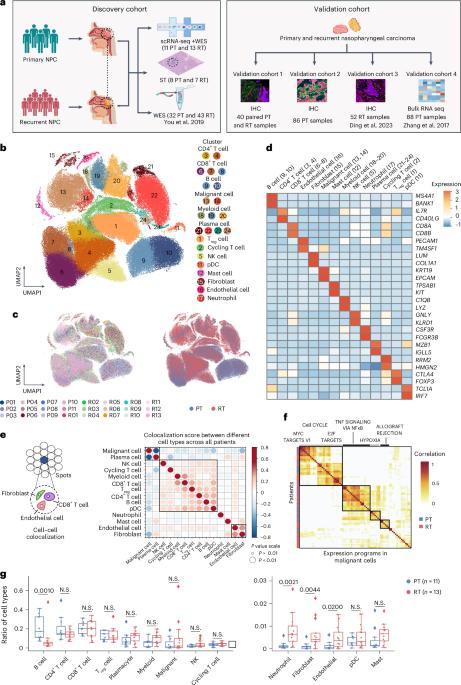Single-cell and spatial transcriptomics reveal mechanisms of radioresistance and immune escape in recurrent nasopharyngeal carcinoma
IF 29
1区 生物学
Q1 GENETICS & HEREDITY
引用次数: 0
Abstract
Radiotherapy resistance and immune evasion are prominent features of recurrent nasopharyngeal carcinoma (rNPC). However, their mechanisms remain incompletely understood. Here, we conducted single-cell and spatial transcriptomics analysis of 39 tumors from 24 patients to reveal the microenvironmental differences between primary and rNPC. Specific MCAM+ cancer-associated fibroblasts are significantly enriched in rNPC, where they promote tumor radioresistance through the collagen IV–ITGA2–FAK–AKT axis. Furthermore, we found that collagen IV suppresses the infiltration of T cells, and we identified mechanisms of immune escape in rNPC. We uncovered the presence and function of CD8 ZNF683 cells in rNPC with lower cytotoxicity. The abundance of B cells and tertiary lymphoid structures significantly diminishes in rNPC. Finally, we confirmed that CD47–SIRPα commonly existed between myeloid and malignant cells in rNPC. This study provides an in-depth understanding of the mechanism of radioresistance and immune evasion in rNPC as well as highlighting critical preliminary targets for curing rNPC. Multi-omic analysis of 39 samples of treatment-naive and recurrent nasopharyngeal carcinomas highlights the importance of the tumor microenvironment in promoting radioresistance and immune escape.


单细胞和空间转录组学揭示复发性鼻咽癌放射耐药和免疫逃逸的机制
放疗抵抗和免疫逃避是复发性鼻咽癌(rNPC)的显著特征。然而,它们的机制仍然不完全清楚。在这里,我们对来自24例患者的39个肿瘤进行了单细胞和空间转录组学分析,以揭示原发性和rNPC之间的微环境差异。特异性MCAM+癌症相关成纤维细胞在rNPC中显著富集,它们通过胶原IV-ITGA2-FAK-AKT轴促进肿瘤放射抵抗。此外,我们发现IV型胶原抑制T细胞的浸润,并确定了rNPC中免疫逃逸的机制。我们发现CD8 ZNF683细胞在rNPC中的存在和功能具有较低的细胞毒性。在rNPC中,B细胞和三级淋巴结构的丰度显著减少。最后,我们证实了CD47-SIRPα在rNPC的髓细胞和恶性细胞之间普遍存在。本研究深入了解了rNPC的辐射耐药和免疫逃避机制,并强调了治疗rNPC的关键初步靶点。
本文章由计算机程序翻译,如有差异,请以英文原文为准。
求助全文
约1分钟内获得全文
求助全文
来源期刊

Nature genetics
生物-遗传学
CiteScore
43.00
自引率
2.60%
发文量
241
审稿时长
3 months
期刊介绍:
Nature Genetics publishes the very highest quality research in genetics. It encompasses genetic and functional genomic studies on human and plant traits and on other model organisms. Current emphasis is on the genetic basis for common and complex diseases and on the functional mechanism, architecture and evolution of gene networks, studied by experimental perturbation.
Integrative genetic topics comprise, but are not limited to:
-Genes in the pathology of human disease
-Molecular analysis of simple and complex genetic traits
-Cancer genetics
-Agricultural genomics
-Developmental genetics
-Regulatory variation in gene expression
-Strategies and technologies for extracting function from genomic data
-Pharmacological genomics
-Genome evolution
 求助内容:
求助内容: 应助结果提醒方式:
应助结果提醒方式:


